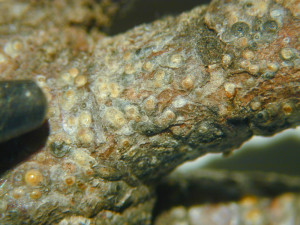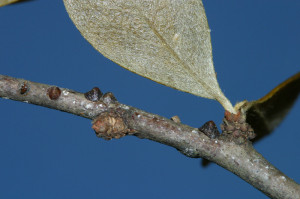
Obscure scale, an armored scale common on oak trees, is well named. Its small size (see pencil point for reference) and bark-like appearance make it especially difficult to detect.
Dormant season applications of horticultural oil can be an effective tactic to kill scale insects and their eggs during the winter months. But with the rapid onset of warm spring weather, the window of opportunity is relatively small in north Texas and many other parts of the state.
Armored scale like obscure and gloomy scale are especially difficult to treat during the summer months, so the dormant season when leaves are off the trees is an excellent time to treat with a dormant oil. Oils are physical poisons, meaning that they act on pests physically rather than biochemically, like most pesticides. Oils are able to creep under the waxy, protective scale cover and coat the eggs or bodies of the tiny insects hidden underneath. The oil coating prevents respiration of the eggs and insect, essentially smothering them. Additional benefits of oils are that they are very safe to apply and have minimal impacts on most beneficial insects.

Soft scales, like this species on Eleagnus, can also be effectively treated with dormant oil sprays during the winter months.
Oils are useful year round, but most oil labels only allow use of higher rates of application during the winter months. The higher rates, in combination with the ability to achieve better coverage when leaves are off the trees, make these dormant season applications more effective than summer applications.
The higher, dormant season application rates tend to damage green foliage, especially tender new spring growth. For this reason, it’s important to not delay your dormant season application too long. Spring will be arriving soon to all parts of Texas and the south, so the next couple of weeks will be the ideal time to apply dormant oil treatments.
For more information on scale insects, see publication B-6097, Scale Insects on Ornamental Plants. For more information about horticultural oils as insecticides, see publication E-419, Using Oils as Pesticides.
